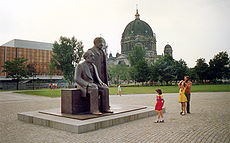- Marx-Engels-Forum
-
Marx-Engels-Forum is a public park in the central Mitte district of Berlin, the capital of Germany. It is named for Karl Marx and Friedrich Engels, authors of The Communist Manifesto of 1848 and regarded as the founders of the Communist movement. The park was created by the authorities of the former German Democratic Republic (GDR) in 1986.
Overview
The Marx-Engels-Forum lies on the eastern bank of the Spree river. It is bound to the south-west by the river, to the north-west by Karl-Liebknecht-Straße, to the north-east by Spandauer Straße and to the south-east by Rathausstraße obliquely opposite of the Rotes Rathaus. Across the river it faces the site formerly occupied by the Palast der Republik (now demolished) and the Berliner Stadtschloss.
Before World War II the area now occupied by Marx-Engels-Forum was a densely populated Old Town quarter between the river and Alexanderplatz, named after a street called Heiligegeiststraße (Holy Ghost Street) which ran across it between Kaiser-Wilhelm-Straße (now Karl-Liebknecht-Straße) and Rathausstraße. The area including the main post office was heavily bombed during Allied air attacks in 1944/45 and most of its buildings reduced to ruins. After the war the ruins were cleared but nothing replaced them.
While the adjacent Nikolaiviertel was to be rebuilt, the GDR authorities in 1977 set up plans for a green space between the Palast der Republik and the Fernsehturm. The sculptor Ludwig Engelhardt was appointed as director of the project to redevelop the site as a tribute to Marx and Engels, the founders of the communist movement to whose ideology the GDR was dedicated. It consists of a rectangular wooded park with a large, circular paved area in the centre with a sculpture by Engelhardt, consisting of larger-than-life bronze figures of Marx (sitting) and Engels (standing). Behind the statues is a relief wall showing scenes from the history of the German socialist movement. The inauguration took place in 1986.
After German reunification in 1990, the future of the Marx-Engels Forum became the subject of public controversy. Some Berliners saw the Forum as an unwanted relic of a defunct regime which they opposed, and argued for the removal of the statues and renaming of the park. Others argued that the site had both artistic and historical significance, and should be preserved. The latter view eventually prevailed, assisted by the generally left-wing tone of Berlin politics. The statues are now a tourist attraction, and a steady stream of people sit on Marx's knee to have their photos taken. With regard to the planned extension of the U5 line of the Berlin U-Bahn turning the park into a construction site for several years, the Berlin mayor Klaus Wowereit has recently launched a discussion whether to rebuild the medieval quarter afterwards. Since the winter of 2010 the statue has now been moved 100m to the east, behind a wire fence enclosure.
External links
 Media related to Marx-Engels-Forum at Wikimedia Commons
Media related to Marx-Engels-Forum at Wikimedia CommonsCoordinates: 52°31′06″N 13°24′15″E / 52.51833°N 13.40417°E
Categories:- Squares in Berlin
- Buildings and structures in Mitte
- Karl Marx
Wikimedia Foundation. 2010.


